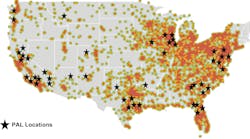Highway accidents are never acceptable, but let's recognize just how far trucking has come.
It's always nice to start a new year with some good news, so let's get 1997 off on the right foot by reporting two very encouraging news items involving truck safety.
The first offers a collective pat on the back to all those fleets and industry organizations that have worked so hard to put safe trucks and drivers out on the road. The National Highway Traffic Safety Administration (NHTSA) has recently released its 1995 statistics on fatal accidents involving trucks, and it is the lowest number ever recorded by the government group.
According to the NHTSA report, large trucks were involved in 2.3 fatal accidents for every 100-million mi. traveled in 1995, down from 2.6 in 1994. (By NHTSA standards, any commercial vehicle over 10,000 lb. GVW is a large truck). In 1979, trucks were involved in 5.2 fatal accidents per 100-million mi., which means that statistic has been more than halved in that 16-year period.
The second item puts a human face on the industry's safety performance. Roney Hill, who has driven for Allied Systems Ltd. for 32 years, has done so without a single accident. Delivering new cars and trucks to retail dealerships out of Allied's West Columbia, S.C., terminal, Hill reached the 3-million accident-free-mile mark last year.
In honor of that achievement, he has been named "Driver of the Year" by the South Carolina Trucking Assn. That kind of industry recognition is nice, but even more significant is the public recognition Hill received for his outstanding safety record -- the award was made by South Carolina's Gov. David Beasley. It's not too often that truck drivers get a highly public thanks for operating their vehicles at the highest levels of safety.
Let's face it, trucking still continues to take its lumps when it comes to public perception. These days trucks are routinely vilified as dangerous bullies of the highways.
Any car maker trying to justify the purchase of its latest 200-plus-hp. rocket only has to produce a television ad showing a smoke-belching tractor bearing down on some frightened sap in an underpowered kiddy car. Never mind that a safe driver is supposed to wait for a break in traffic before merging, the not-too-subtle message is that you wouldn't have to be afraid of those bullying trucks if you were manly enough to buy a real car capable of going from 0 to 60 in 4.7 seconds.
Those ads wouldn't be very effective, though, if they didn't exploit a commonly held image, an image that others are doing their best to reinforce. On the very day Gov. Beasley was shaking Roney Hill's hand, the self-styled truck safety advocate group Citizens for Reliable and Safe Highways (CRASH) released its top ten list of the most dangerous states for truck crash fatalities. Ironically, Hill's home state of South Carolina was number 10.
Using the 1995 NHTSA numbers, the CRASH press release then went on to point out that the national average for large truck-related fatalities (that's total deaths as opposed to fatal accidents) was 2.8 per 100-million vehicle miles in 1995, compared with 1.6 deaths for all motor vehicles. Its conclusion: "This comparison shows that large trucks are over-involved in fatal crashes by 59%."
No mention of the vastly different physical forces at play in crashes involving an 80,000-lb. truck or a 3,000-lb. car. No mention of NHTSA's findings on accident fault (cars were cited as responsible in 72% of police reports). And certainly no mention of trucking's dramatically improved safety record.
That kind of selective reporting makes me angry, especially when it hides some real progress on an issue as important as highway safety. Still, I started off by offering some good news to begin the year, and I'd like to put CRASH aside for the moment and end on a similar note. To Roney Hill and all those other professional drivers with millions of accident-free miles, congratulations on a difficult job well done. And to all those fleet managers whose commitment to safety has made our highways safer, keep up the good work, even if it sometimes seems like no one notices.


